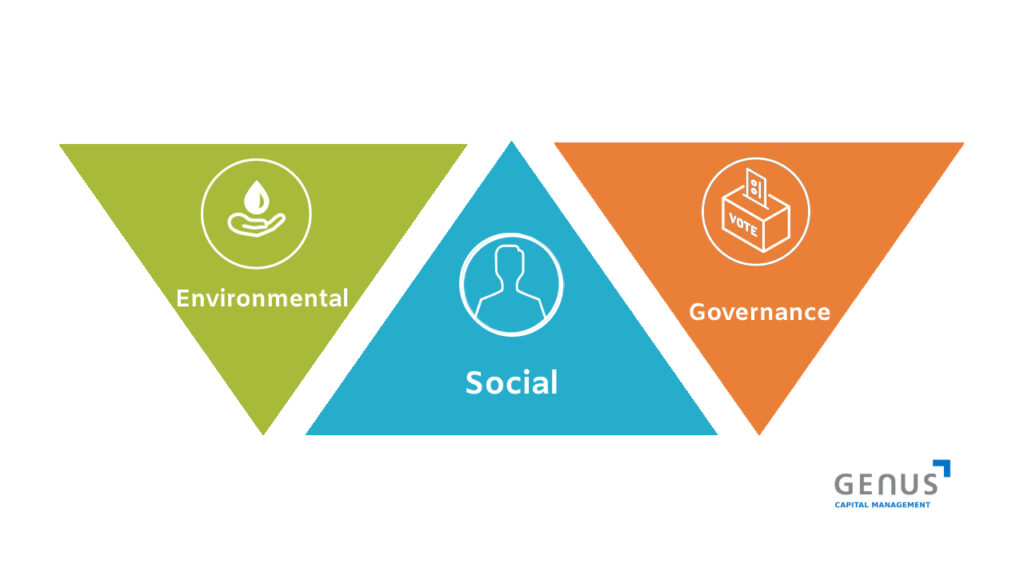There is a longstanding perception in the investment industry that investing in at least some of the “bad stuff” (extractive industries, corporations with poor human rights records, those with an outsized impact on climate change, etc.) is a requirement for generating strong returns. Over time, that perception is gradually being dispelled and part of what has supported that shift toward sustainable investing strategies is Environmental, Social and Governance (ESG) investing.
What is ESG Investing?
ESG, or Environmental, Social, Governance, are factors in measuring a company’s sustainability and ethical impact. ESG measures the overall impact a company holds, from its environmental responsibilities, social impact, and legal.
More than an investment, ESG looks to ensure a net-positive impact on the environment, community, and the market.
- ENVIRONMENT
- SOCIAL
- GOVERNANCE
Companies are ranked on the sustainability of their business: resource, waste, and carbon-emissions foot-print.
Companies are ranked on the involvement of human rights, consumer privacy, animal welfare, and diversity.
Companies are ranked on items like clarity, manager compensation, employee engagement, and management formation.
Why is it Relevant Now?
Though ESG investing has been around for some time, a shift in attitudes about corporate social responsibility and the emergence of shareholder activism have brought it closer to the mainstream. BlackRock CEO Larry Fink’s annual letters to shareholders have become rallying cries — as well as a directive for those seeking BlackRock’s funding — for the industry to think beyond a financial bottom line. If it’s true that you can’t manage what you don’t measure, part of thinking beyond profit alone has to include examining and ranking the companies you invest in. Environmental, social and governance factors provide the framework for this examination.
Why Investors are Increasingly Concerned with Environmental, Social and Governance Factors
A key driver in the growth of ESG investing is that, well, it pays off. A Harvard study that spanned 18 years found that companies that adopted environmental, social and governance policies performed better than those that did not. Nordea Equity Research’s 2017 study showed that, over a three-year period, the companies with ESG ratings at the top of the scale outperformed those at the bottom by up to 40%.
Another factor driving the growth of ESG investing is the concentration of assets among a few firms. The top 10 asset managers in the investment industry hold a staggering 34% of externally managed assets, which make them vulnerable to major shifts in the global economy. To take a short-term view on returns would be at their peril.
Retail investors aren’t the only ones seeking out a sustainable investing strategy – pension funds are fielding an increasing number of questions about balancing fiduciary duty with how their investments will affect the very future they’re meant to finance. With climate change accelerating extreme weather events, and increasing evidence that energy companies bear at least some responsibility for this acceleration, the very definition of fiduciary duty is changing. High-net-worth individuals who want to feel good about their legacies are also seeking out investments that make the world a better place.
Another factor propelling ESG investing to the forefront is a change in workplace demographics. Millennial employees at investment firms have an expectation that their firms are at least looking into a company’s environmental, social and governance factors before investing. They desire a sense of purpose in the work that they do.
How Companies Seeking Investment Can Position Themselves for Success
Companies looking to stand out as strong ESG contenders need to signal that they are listening, and open to regular communication with both shareholders and stakeholders. A strong mission statement, or Statement of Purpose, is a good start. Company reports should include how improvements in environment, social and governance areas are driving shareholder value, both financially and socially. Quarterly conference calls should include updates on ESG developments. And investing in robust ESG measurement and reporting will yield quality data to help investors make informed decisions.
Interested in exploring sustainable investing strategies? Contact a Genus advisor to learn more.











